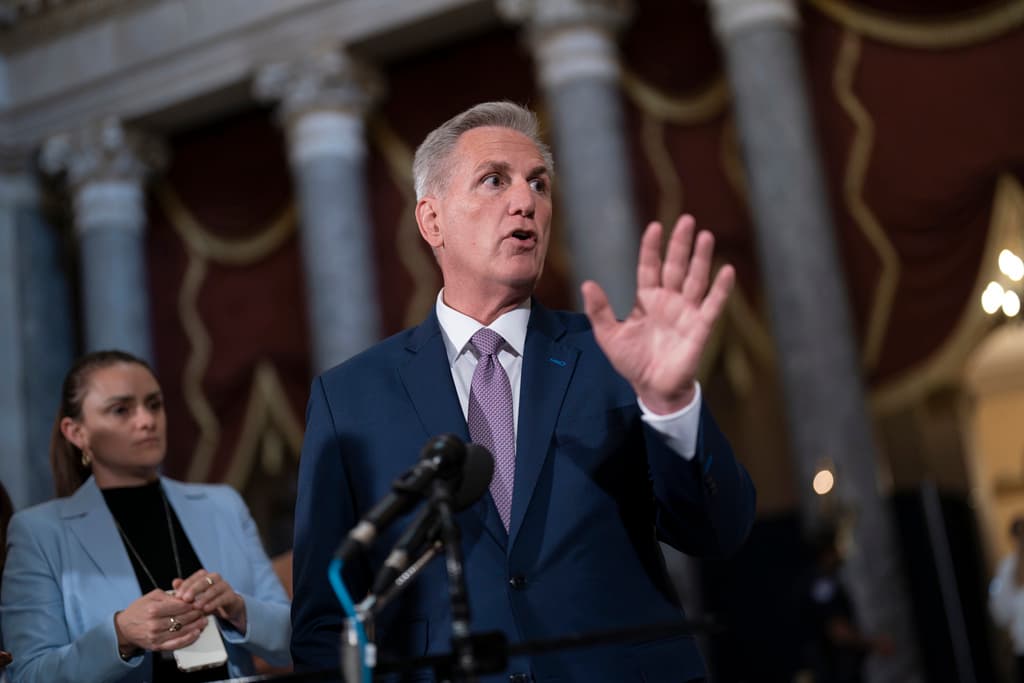White House Silent Following Passage of Debt Ceiling Deal in the House
The bill from the House is likely dead on arrival in the Senate as the debt ceiling deadline fast approaches.

Despite significant doubts from political watchers, Speaker McCarthy managed to pass a Republican-backed debt ceiling deal early Thursday morning. Now, Mr. McCarthy must hold his strained conference together while negotiating with the White House.
The House voted to raise the debt ceiling by $1.5 trillion or through March 2024, whichever comes first. The deal, which only four Republicans voted against, contains a number of nonstarters for Democrats and the White House.
President Biden has already promised to veto the deal if it lands on his desk in its current iteration, saying that it “would make it easier for wealthy tax cheats to avoid the taxes they owe, even as House Republicans are advancing other proposals that would spend trillions more on tax cuts skewed to the wealthy and big corporations.”
“Altogether, this legislation would not only risk default, recession, widespread job loss, and years of higher interest rates, but also make devastating cuts to programs that hard-working Americans and the middle-class count on,” a statement from Mr. Biden reads.
The bill would cut spending to 2021 levels — which were already elevated because of pandemic relief measures — for most federal programs and constrain future spending growth to 1 percent annually, cutting the budget every year in real terms.
Beyond general restrictions, the deal also takes aim at specific Democratic policies and would roll back Mr. Biden’s student debt forgiveness plan as well as reclaim unspent federal Covid relief money.
The deal also institutes new requirements for food security and other welfare programs, as well as Medicaid. It would require food stamp recipients to show they are working up to the age of 56. Currently they must prove they are working up to the age of 50. Failing to report working 20 hours a week for a three-month period would cut off recipients from benefits.
The bill would also repeal swaths of the Inflation Reduction Act passed in 2022 that addresses national climate policy, energy policy, and health care.
Mr. McCarthy’s debt deal is also not a budget deal. After budget negotiations stalled, Mr. McCarthy decided to separate the debt and budget bills. While the debt ceiling bill will need to be passed sometime this summer, the current government budget expires on September 30.
So far, Mr. McCarthy has dismissed the president’s promise to veto the bill as well as his refusal to negotiate over the debt ceiling. The two haven’t had a real meeting on the issue since the beginning of February.
The deal passed with the thinnest margin possible. Mr. McCarthy could only afford to lose four votes on the deal, and he lost all four. Representatives Matt Gaetz, Andy Biggs, Ken Buck, and Tim Burchett all joined Democrats in voting no on the bill.
“I never get mad,” Mr. Gaetz told NBC of the vote. “But it has a practical consequence when at 2 in the morning changes are made and we’re asked to vote in the subsequent several hours.”
The next test for Mr. McCarthy and House Republicans will be whether the conference can remain united through the next stages of negotiations as the debt ceiling deadline approaches.
The Department of the Treasury, currently using “extraordinary measures” to meet the country’s fiscal responsibilities, initially predicted it would avoid default at least in early June.
Other estimates have put the “x date” later, sometime in late summer or early fall. With lower than anticipated tax revenues trickling in, though, some economists have moved up their predictions, with Bank of America moving its “x date” to August 1.

